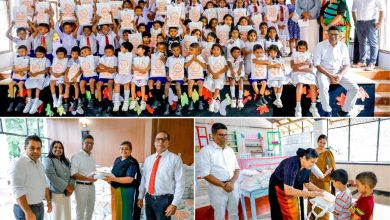LMDtv 2
 Having withstood multiple crises, and emerging resilient and robust, Sri Lanka is poised for growth. “Looking to the future and focussing on opportunities available to Sri Lanka is vital,” noted the Managing Editor of Serendib News Virosh Perera, in a recent LMDtv interview.
Having withstood multiple crises, and emerging resilient and robust, Sri Lanka is poised for growth. “Looking to the future and focussing on opportunities available to Sri Lanka is vital,” noted the Managing Editor of Serendib News Virosh Perera, in a recent LMDtv interview.
He also stressed the importance of working hard to become a better nation: “No nation has had a cakewalk; they all worked hard to get to where they are – if you look at Australia, it’s still working hard.”
Perera believes in the need for self-sufficiency to achieve recognition on the world stage. “We shouldn’t depend on international communities; everyone should do their bit without asking for funds or support. We should fix our problems internally and show the world what we’re capable of,” he remarked.
He elaborated: “When we’ve developed specialised domain knowledge and expertise, we become of value to other countries and they will look at us differently. They must see us as a strategic partner. Today, we’re not a strategic partner; and that’s why we don’t garner the recognition and respect we deserve.”
When asked how Sri Lanka should brand itself to the rest of the world, Perera pointed to hospitality, asserting that “we should position ourselves as the most hospitable nation on Earth.”
“We’re No. 1 in human capital in hospitality – our people are a true testimony to this,” he said, emphasising that “by positioning ourselves this way, we will attract not only tourists but a lot of businesses to Sri Lanka too.”
While applauding the wave of entrepreneurship in agriculture and tourism in Sri Lanka today, Perera highlighted the need for the island to build enabling infrastructure and systems to invite investments from expat Sri Lankans.
“If proper infrastructure is in place, many Sri Lankans living overseas will come and do something for the country,” he explained, noting: “We can put the icing on the cake; but without a cake, there can be no icing.”
Perera underscored the need for Sri Lanka to provide opportunities for Sri Lankans to return and give back to their country of birth: “I’d love to see something like what they have in Singapore – a proper system so that we can come and be a part of that system, and do solid work without having to depend on government.”
He also discussed the myriad opportunities available to Sri Lankans in Australia and around the world, and the need for them to duly upskill themselves.
Perera noted: “Generally, Sri Lankans are keen on educating themselves – common ambitions include becoming a doctor, a lawyer, an engineer or an accountant. Yet today, if you look at Australia, people in other vocations make more money than doctors.”
“You can easily migrate to Australia or any country if you have good skills – including vocational skills… Sri Lankans shouldn’t have the mindset of only wanting to be a doctor, a lawyer or an engineer – there are lots of other opportunities,” he maintained.
And he opined: “If the next generation of Sri Lankans wants to do something, I‘d say that academics isn’t the only path.”
Although certain barriers have been put in place to limit migration to Australia due to capacity constraints and other implications of global economic turbulence, Perera is confident that good skills can reap migration opportunities.
“If you’re educated and have relevant skills, you can come and be a part of the system here. And if you’re not skilled, you need to upgrade yourself to make use of the available opportunities,” he explained.
Perera is keen to see Sri Lanka shine on the world stage as a united nation: “I want Sri Lanka to be a global citizen. Within the country, we shouldn’t be competing in terms of whether we’re from Colombo, Kandy or Matara – there’s no competition. We are one nation.”
“When we venture overseas, we don’t say ‘I’m from Kandy’; we say we’re from Sri Lanka,” he said, concluding that “it’s always good to have one identity – Sri Lankan.”


